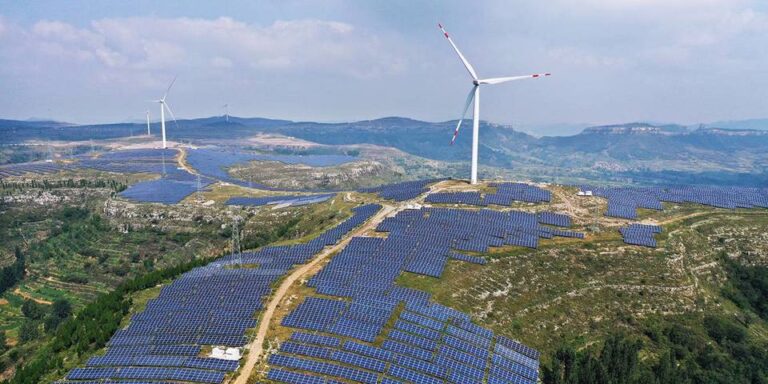China’s Energy Crisis Is Hitting Everything From iPhones to Milk

NEW DELHI: The hit from China’s energy crunch is starting to ripple throughout the globe, hurting everyone from Toyota Motor Corp to Australian sheep farmers and makers of cardboard boxes.
Not only is the extreme electricity shortage in the world’s largest exporter set to hurt its own growth, the knock-on impact to supply chains could crimp a global economy struggling to emerge from the pandemic.
The timing couldn’t be worse, with the shipping industry already facing congested supply lines that are delaying deliveries of clothes and toys for the year-end holidays. It also comes just as China starts its harvest season, raising concerns over sharply higher grocery bills.
China’s export growth unexpectedly surged in August, with port disruptions due to fresh outbreaks of the delta virus having limited impact on trade.
“If the electricity shortages and production cuts continue, they could become yet another factor causing global supply-side problems, especially if they start to affect the production of export products,” said Louis Kuijs, senior Asia economist at Oxford Economics.
Slower growth
Economists have already warned of slower growth in China. At Citigroup, a vulnerability index indicates that exporters of manufactured goods and commodities are particularly at risk to a weakening Chinese economy.
Neighbors like Taiwan and Korea are sensitive, as are metal exporters such as Australia and Chile, and key trading partners such as Germany are also somewhat exposed.
As for consumers, the question is whether manufacturers will be able to absorb higher costs or will pass them along.
“This is looking like another stagflationary shock for manufacturing, not just for China but for the world,” said Craig Botham, chief China economist at Pantheon Macroeconomics. “The price increases by now are pretty broad-based — a consequence of China’s deep involvement in global supply chains.”
UN index of global food costs is at the highest in a decade
Beijing has been scouring for power supplies as it tries to stabilize the situation. The impact on the global economy will depend on how quickly those efforts bear fruit.
Many Chinese factories reduced production for this week’s “Golden Week” holiday, and economists are closely watching whether power shortages will return as they ramp up again.
Already, though, some industries are under pressure, and the damage they’re seeing could quickly fan out to other sectors.
Paper
Consider paper. Production of cardboard boxes and packing materials was already strained by skyrocketing demand during the pandemic.
Now, temporary shutdowns in China have hit output even harder, leading to a possible 10% to 15% reduction in supply for September and October, according to Rabobank. That will add further complications to businesses already suffering from the global paper shortage.
Food
The food supply chain is also at risk as the energy crisis makes harvest season more challenging for the world’s biggest agricultural producer.
Global food prices have already jumped to a decade high, and worries are mounting that the situation will worsen as China struggles to handle crops from corn to soy to peanuts and cotton.
In recent weeks, several plants were forced to shut or reduce output to conserve electricity, such as soybean processors that crush beans to produce meal for animal feed and oil for cooking.
Prices for fertilizer, one of the most important elements of agriculture, are skyrocketing, slamming farmers already buckling under the strain of rising costs.
The processing industry is set to be more severely affected than staples such as grains and meat, Rabobank analysts wrote in a report this week. In the dairy sector, power cuts could disrupt the operation of milking machines, while pork suppliers will face pressure from tighter supply of cold storage.
Wool
Outside of China, Australian sheep farmers are bracing for weaker demand just as they seek to sell their wool at auctions. The industry saw Chinese mills reduce production by up to 40% due to power cuts last week, Australian Broadcasting Corp reported.
Tech
The tech world could also see a dramatic hit, given that China is the world’s biggest production base for gadgets from iPhones to gaming consoles, and a major center for the packaging of semiconductors used in autos and appliances.
Several companies have already experienced downtime at their Chinese facilities to comply with local restrictions. Pegatron Corp, a key partner for Apple, said last month it began to adopt energy-saving measures, while ASE Technology Holding Co, the world’s biggest chip packager, halted production for several days.
The overall impact on the tech sector has so far been limited because of customary shutdowns around the week-long holiday. Should the energy crunch worsen, it could hit production ahead of the crucial year-end shopping season.
Industry giants including Dell Technologies Inc and Sony Group Corp can ill afford another supply shock after pandemic-induced turmoil fomented a global chip shortage that will extend well into 2022 and beyond.
Automakers
Any further deterioration of the semiconductor market would also add headaches for automakers, who have already seen production crunched by the chip shortage.
The industry, which is high on the list of protected sectors in times like these, has thus far largely been spared from the effects of the power crisis.
Still, there have been some isolated instances. Toyota, which produces more than 1 million vehicles a year in China at plants centered around Tianjin and Guangzhou, has said some of its operations have been impacted by the power shortages.








DENVER – For decades, we at the Rocky Mountain Institute (now RMI) have argued that the transition to clean energy will cost less and proceed faster than governments, firms, and many analysts expect. In recent years, this outlook has been fully vindicated: costs of renewables have consistently fallen faster than expected, while deployment has proceeded more rapidly than predicted, thereby reducing costs even further.
Thanks to this virtuous cycle, renewables have broken through. And now, new analyses from two authoritative research institutions have added to the mountain of data showing that a rapid clean-energy transition is the least expensive path forward.
Policymakers, business leaders, and financial institutions urgently need to consider the promising implications of this development. With the United Nations Climate Change Conference (COP26) in Glasgow fast approaching, it is imperative that world leaders recognize that achieving the Paris climate agreement’s 1.5° Celsius warming target is not about making sacrifices; it is about seizing opportunities. The negotiation process must be reframed so that it is less about burden-sharing and more about a lucrative race to deploy cleaner, cheaper energy technologies.
With the world already suffering from climate-driven extreme weather events, a rapid clean-energy transition also has the virtue of being the safest route ahead. If we fail at this historic task, we risk not only wasting trillions of dollars but also pushing civilization further down a dangerous and potentially catastrophic path of climate change.
One can only guess why forecasters have, for decades, underestimated the falling costs and accelerating pace of deployment for renewables. But the results are clear: bad predictions have underwritten trillions of dollars of investment in energy infrastructure that is not only more expensive but also more damaging to human society and all life on the planet.
We now face what may be our last chance to correct for decades of missed opportunities. Either we will continue to waste trillions more on a system that is killing us, or we will move rapidly to the cheaper, cleaner, more advanced energy solutions of the future.
New studies have shed light on how a rapid clean-energy transition would work. In the International Renewable Energy Agency (IRENA) report The Renewable Spring, lead author Kingsmill Bond shows that renewables are following the same exponential growth curve as past technology revolutions, hewing to predictable and well-understood patterns.
Accordingly, Bond notes that the energy transition will continue to attract capital and build its own momentum. But this process can and should be supported to ensure that it proceeds as quickly as possible. Policymakers who want to drive change must create an enabling environment for the optimal flow of capital. Bond clearly lays out the sequence of steps that this process entails.
Examining past energy revolutions reveals several important insights. First, capital is attracted to technological disruptions, and tends to flow to the areas of growth and opportunity associated with the start of these revolutions. As a result, once a new set of technologies passes its gestation period, capital becomes widely available. Second, financial markets draw forward change. As capital moves, it speeds up the process of change by allocating new capital to growth industries, and by withdrawing it from those in decline.
The current signals from financial markets show that we are in the first phase of a predictable energy transition, with spectacular outperformance by new energy sectors and the de-rating of the fossil-fuel sector. This is the point where wise policymakers can step in to establish the necessary institutional framework to accelerate the energy transition and realize the economic benefits of building local clean-energy supply chains. As we can see from market trends highlighted in the IRENA report, the shift is already well underway.
Reinforcing the findings from the IRENA report, a recent analysis from the Institute for New Economic Thinking (INET) at the Oxford Martin School shows that a rapid transition to clean energy solutions will save trillions of dollars, in addition to keeping the world aligned with the Paris agreement’s 1.5°C goal. A slower deployment path would be financially costlier than a faster one and would incur significantly higher climate costs from avoidable disasters and deteriorating living conditions.
Owing to the power of exponential growth, an accelerated path for renewables is eminently achievable. The INET Oxford report finds that if the deployment of solar, wind, batteries, and hydrogen electrolyzers continues to follow exponential growth trends for another decade, the world will be on track to achieve net-zero-emissions energy generation within 25 years.
In its own coverage of the report, Bloomberg News suggests as a “conservative estimate” that a rapid clean-energy transition would save $26 trillion compared with continuing with today’s energy system. After all, the more solar and wind power we build, the greater the price reductions for those technologies.
Moreover, in his own response to the INET Oxford study, Bill McKibben of 350.org points out that the cost of fossil fuels will not fall, and that any technological learning curve advantage for oil and gas will be offset by the fact that the world’s easy-access reserves have already been exploited. Hence, he warns that precisely because solar and wind will save consumers money, the fossil-fuel industry will continue to try to slow down the transition in order to mitigate its own losses.
We must not allow any further delay. As we approach COP26, it is essential that world leaders understand that we already have cleaner, cheaper energy solutions ready to deploy now. Hitting our 1.5°C target is not about making sacrifices; it is about seizing opportunities. If we get to work now, we can save trillions of dollars and avert the climate devastation that otherwise will be visited upon our children and grandchildren.